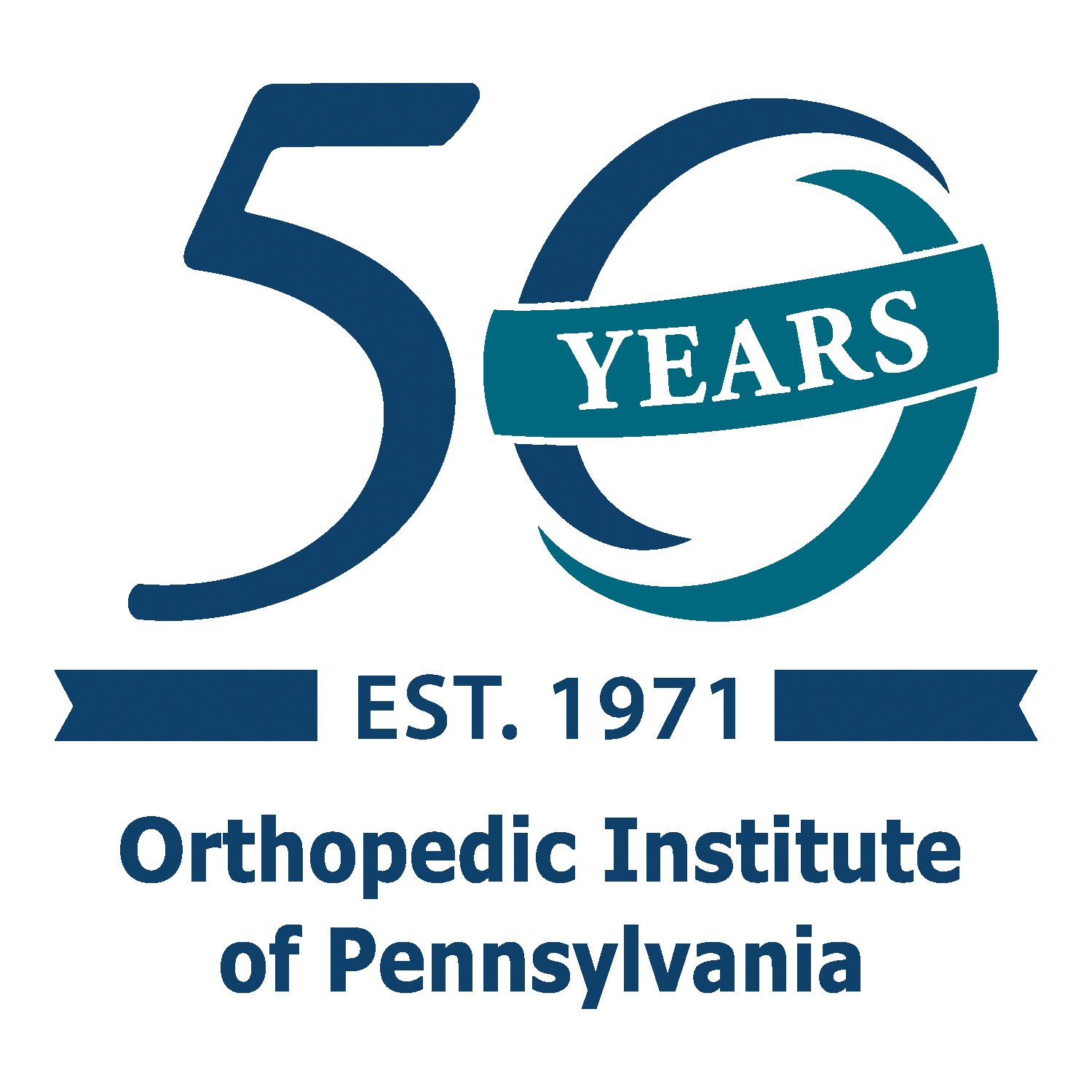Join OIP for a Free Session on Diabetic Peripheral Neuropathy (DPN)
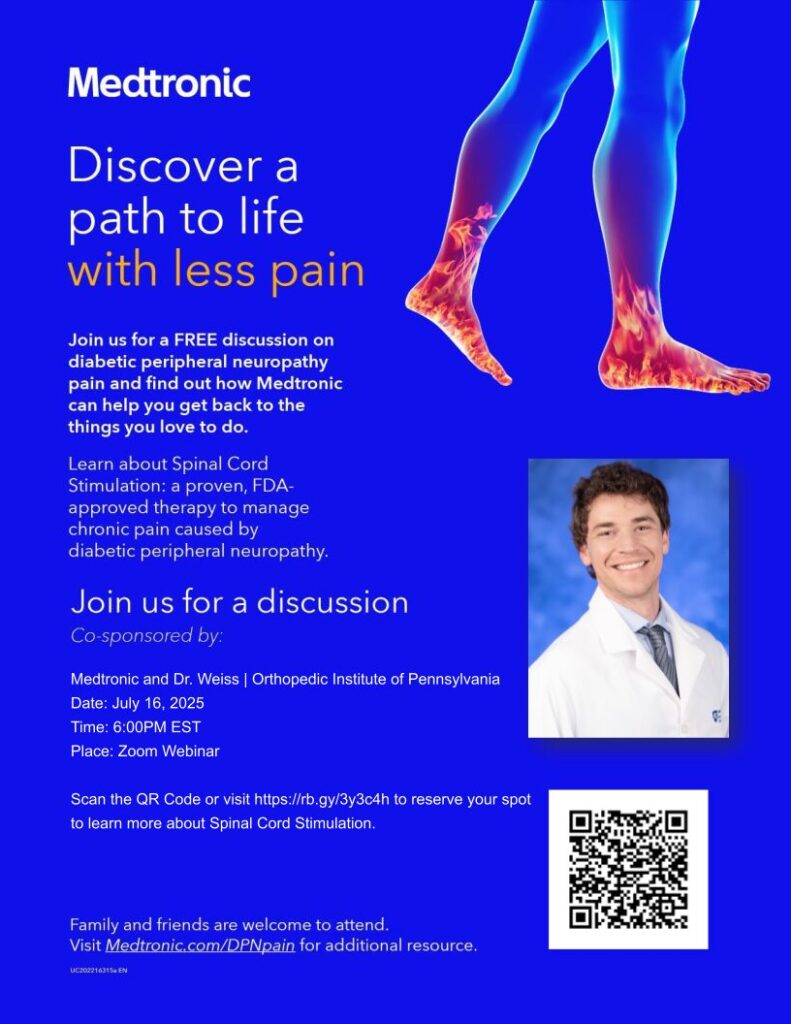
Take a step forward in Pain Relief with Medtronic and Dr. Weiss.
If you or a loved one are experiencing Diabetic Peripheral Neuropathy pain, start saying yes to the activities you love. Medtronic Spinal Cord Stimulation is now indicated to treat the pain associated with DPN of the lower extremities. Join us on July 16th at 6 pm to learn more!
Free 2025 PIAA Sports Physicals

These Pennsylvania Interscholastic Athletic Association (PIAA) sports physicals are free for athletes in middle and high school who are participating in a PIAA sport.
Click here to reserve your FREE time slot today.
DATES | LOCATIONS:
- Camp Hill | Thursday, July 10 | 6-8 PM
3399 Trindle Road - Harrisburg | Wednesday, July 16 | 6-8 PM
450 Powers Avenue - Hershey | Monday, July 21 | 6-8 PM
112 Sipe Avenue - Carlisle | Tuesday, July 29 | 6-8 PM
250 Alexander Spring Road
REMINDERS:
- Athletes MUST bring completed PIAA forms to the appointment. You can download them here.
- Sections 6 & 7 must be completed and brought to the physical appointment.
- A parent or guardian MUST accompany students under 18 years old.
- The physicals are for students entering 7th and above.
- This option is only for PIAA physicals – Physicals for Driver’s licenses will not be performed.
Questions? Call (717) 980-3593.
Join Us March 17th for an Exclusive Education Seminar on Hip & Knee Arthritis!
Struggling with hip or knee pain? Learn about the latest treatment options from Dr. Nathan Angerett, a fellowship-trained orthopedic surgeon specializing in hip and knee reconstruction.
Date: March 17, 2025
Time: 6:00 PM
Location: The Theater, The Terraces at Capitol Village
Address: 4004 Linglestown Road, Harrisburg, PA
Dr. Angerett will cover non-surgical treatments, advanced pain management techniques, and the latest in robotic and direct anterior hip replacement surgery. Whether you’re exploring options for managing arthritis or considering joint replacement, this event is for you!
Call 717.441.8880 for more details.
Don’t miss this opportunity to take control of your joint health! Share with a friend or loved one who might benefit.
New OIC Hours Starting January 2nd!
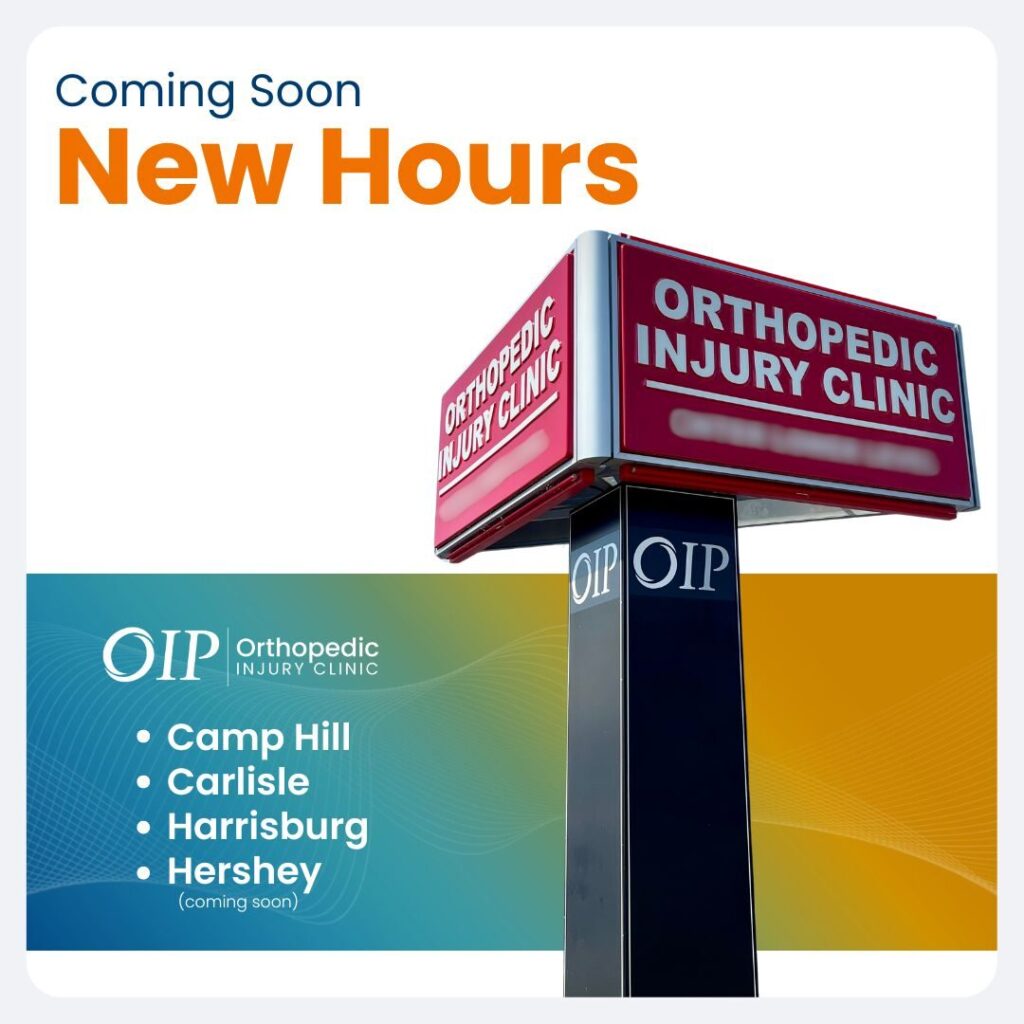
Big News: New OIC Hours Starting January 2nd!
OIP Orthopedic Injury Clinic is making it even easier to access expert orthopedic care. Skip the ER and visit one of our convenient locations with new hours coming soon:
Camp Hill (West OIC)
- Mon–Fri: 8 AM–7:30 PM
- Sat–Sun: 8:30 AM–5:30 PM
Harrisburg (East OIC)
- Mon–Fri: 8 AM–4:30 PM
Carlisle OIC
- Mon–Fri: 8 AM–4:30 PM
Hershey OIC – Coming Soon in 2025!
We’ve heard your requests for greater access and have modified our opening and closing process to better serve your needs.
Breakthrough in Pain Relief: Dr. DeLuca’s Lumbar Fusion Surgery
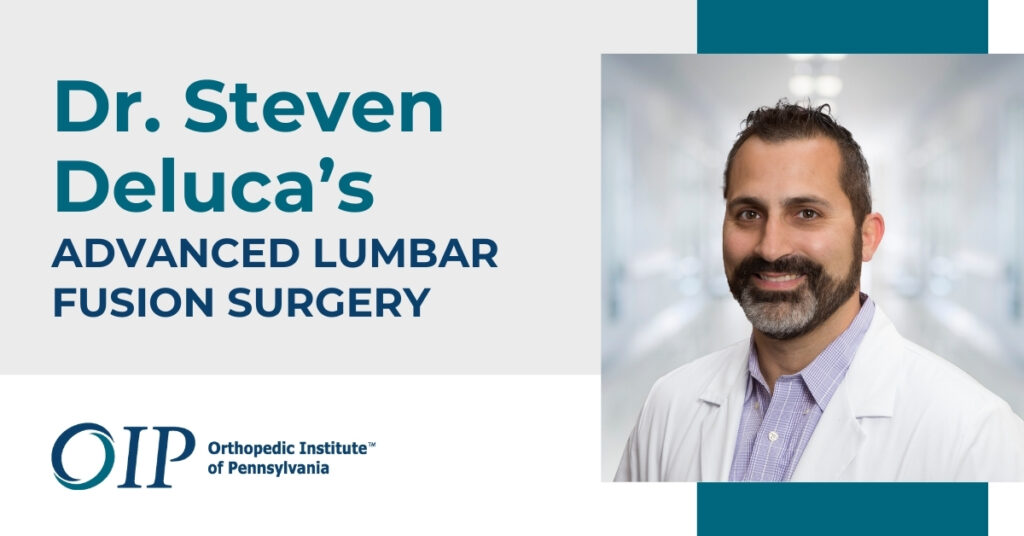
At the Orthopedic Institute of Pennsylvania (OIP), we are dedicated to improving the lives of our patients through advanced medical techniques and compassionate, extraordinary care. We are thrilled to share a recent success story from Dr. Steven DeLuca, who performed a groundbreaking minimally invasive lumbar fusion surgery in Camp Hill, Pennsylvania. This innovative procedure not only alleviated chronic back and leg pain for one patient but exemplifies the state-of-the-art treatments available at OIP.
Chronic Pain, a Persistent Challenge
Chronic pain can be debilitating, affecting every aspect of a person’s life. This was the reality for a 59-year-old female patient who suffered from severe chronic pain in her right thigh, which spread from her hip to her knee. Despite multiple surgeries, her pain persisted, severely diminishing her quality of life.
A Revoluationary Solution
Enter Dr. Steven Deluca, a seasoned orthopedic surgeon at OIP, known for his expertise in minimally invasive procedures. Utilizing the advanced FlareHawk7™ Interbody Fusion System, Dr. Deluca addressed the patient’s condition with a less invasive approach that promises to be transformative for others facing similar issues. This innovative system is designed to provide optimal fusion and stability, allowing surgeons to perform complex procedures through smaller incisions. As a result, patients experience less bodily disruption during surgery, leading to reduced pain and faster recovery times.
This procedure’s minimally invasive nature allowed for the precise implant placement through a small incision. To ensure stability and success, Dr. DeLuca also employed the LineSider® Spinal System, which provides robust structural support. This enhancement of the fusion process ensures proper spinal alignment during healing, ultimately allowing patients to return to their daily lives more quickly and comfortably.
Remarkable Results
The outcome of the surgery was nothing short of remarkable. The patient experienced a significant reduction in pain almost immediately after the surgery. Following a one-night stay in the hospital for observation, she was able to return home the next day, relieved and on the path to a better quality of life.
Dr. DeLuca was particularly pleased with the height restoration and positioning achieved with the FlareHawk7™ implant, noting its favorable comparison to more invasive surgical techniques.
The Expertise Behind the Success
Dr. Steven DeLuca has been a vital part of OIP since 2007, bringing a wealth of knowledge and experience in orthopedic and spine surgery. He is board-certified and has been recognized for his contributions to the field, including performing the first TOPS™ surgery in the United States. His practice encompasses a wide range of procedures, from minimally invasive spine surgeries to robotic-assisted joint replacements. Additionally, Dr. DeLuca is the only surgeon in the region who performs the “bikini” technique, a variation of the standard anterior approach to hip replacement that minimizes scarring and speeds up recovery.
A Commitment to Extraordinary Patient Care
At OIP, we are committed to providing our patients with the highest level of care using the latest advancements in medical technology. Dr. DeLuca’s success story is a testament to our dedication to improving patient outcomes through innovative treatments that address chronic pain at its source. We are proud to offer such advanced procedures that can significantly enhance the quality of life for our patients.
OIP Expands Non-Opioid Pain Management Services with Dr. David Weiss

Orthopedic Institute Pennsylvania (OIP) is pleased to announce the addition of Dr. David Weiss to our team of expert physicians, effective August 5th, 2024. Dr. Weiss, a fellowship-trained interventional pain physician, will strengthen OIP’s commitment to providing non-opioid pain management solutions in Central Pennsylvania.
Addressing the Growing Need for Non-Opioid Pain Management
As the opioid epidemic continues to impact communities nationwide, the demand for effective, non-addictive pain treatments has never been greater. Dr. Weiss’s expertise in non-opioid, non-surgical pain management aligns perfectly with OIP’s mission to provide the highest quality care to our patients.
“With the addition of a highly-skilled physician like Dr. Weiss, we are well positioned to provide relief to even more patients needing effective, non-addictive pain treatments,” said Tim Duffy, CEO of OIP.
Dr. Weiss’s Comprehensive Pain Management Background
Dr. Weiss completed his Pain Medicine Fellowship at Penn State Health Milton S. Hershey Medical Center, where he was recognized for his outstanding communication skills and collaborative care approach. His specialties include:
- Non-opioid, non-surgical acute and chronic pain treatments
- Non-surgical neck, back, and spine pain management
- Non-invasive joint pain management
- Advanced interventional techniques such as neuromodulation and spinal cord stimulation
A Patient-Centered Approach
Dr. Weiss is known for his patient-centric approach to pain management. He works closely with patients to design personalized care plans that address their unique needs and help them return to the activities they love.
“Dr. Weiss’s expertise in non-opioid, non-addictive therapies, including injections and neuromodulation, makes him a valuable addition to our team,” said Dr. Taryn Reichard, DO of OIP.
Expanding Access to Advanced Pain Management
With Dr. Weiss joining the team, OIP continues strengthening its position as Central Pennsylvania’s leading orthopedic and pain management care provider. Hershey, Harrisburg, and Carlisle patients will now have increased access to non-opioid pain management solutions.
Take the First Step Towards Lasting Relief
If you’re struggling with chronic pain, don’t wait to seek help. Schedule an appointment with Dr. Weiss or another OIP pain management specialist by calling 717.761.5530.
2024 Free PIAA Sports Physicals from OIP!
Free PIAA Sports Physicals from the trusted team at OIP

- Harrisburg | Wednesday, July 10 | 6-8 PM
450 Powers Avenue - Camp Hill | Thursday, July 18 | 6-8 PM
3399 Trindle Road - Hershey | Monday, July 22 | 6-8 PM
112 Sipe Avenue - Carlisle | Tuesday, July 30 | 6-8 PM
250 Alexander Spring Road
REMINDERS:
- Athletes MUST bring completed PIAA forms to the appointment. You can download them here.
- Sections 6 & 7 must be completed and brought to the physical appointment.
- A parent or guardian MUST accompany students under 18 years old.
- The physicals are for students entering 7th and above.
- This option is only for PIAA physicals – Physicals for Driver’s licenses will not be performed.
Questions? Call (717) 980-3593.
Orthopedic Institute of Pennsylvania Nominated for Five “Simply the Best” Awards!
We’re thrilled to announce that the Orthopedic Institute of Pennsylvania has been nominated in five categories for Harrisburg Magazine’s “Simply the Best” 2024 Awards!
Our Nominations:
- Pain Specialist Clinic: Recognized for our innovative and successful approaches to pain management.
- Place to Work (101+ Employees): Honored for fostering a supportive and engaging workplace.
- Customer Values (Large Business): Acknowledged for prioritizing patient-centric care, transparency, and integrity.
- Physical Therapist: Celebrating our therapists’ expertise, empathy, and dedication to patient outcomes.
- Walk-In Urgent Care Facility: Recognized for providing accessible and efficient top-tier medical attention.
What These Nominations Mean to Us
These nominations are a testament to the trust our community places in us and the hard work of our dedicated staff. They inspire us to continue pushing the boundaries of what we can achieve in providing healthcare excellence.
A Big Thank You
We owe this honor to our exceptional team, as well as our patients. Your support and trust in our mission have made these nominations possible. Thank you for your unwavering support.
Nominations Encourage Improvement and Innovation
These nominations motivate us to keep improving and innovating in all aspects of our services. Whether you seek treatment, a rewarding career, or trustworthy healthcare advice, the Orthopedic Institute of Pennsylvania is dedicated to being simply the best.
Vote to Share Your Experience!
We appreciate your support and invite you to celebrate with us. If you have experienced our care firsthand, please vote for us!
VOTE – Walk-In Urgent Care Facility
VOTE – Pain Specialist Clinic
VOTE – Physical Therapist
VOTE – Customer Values (Large Business)
VOTE – Place to Work (101+ Employees)
The voting period goes live on April 15th, 2024, through June 15th, 2024, at midnight.
Dr. Tyson Maugle to Give Talk on Low Back and Neck Pain – What are Your Options?
Date: Sunday, October 15th
Location: Holiday Essex House – 20 n 12th st Lemoyne PA 17043
Time: 2:00 pm EST
RSVP to Wendy Crecelius at wcrecelius@oip.com or 717-980-3593.
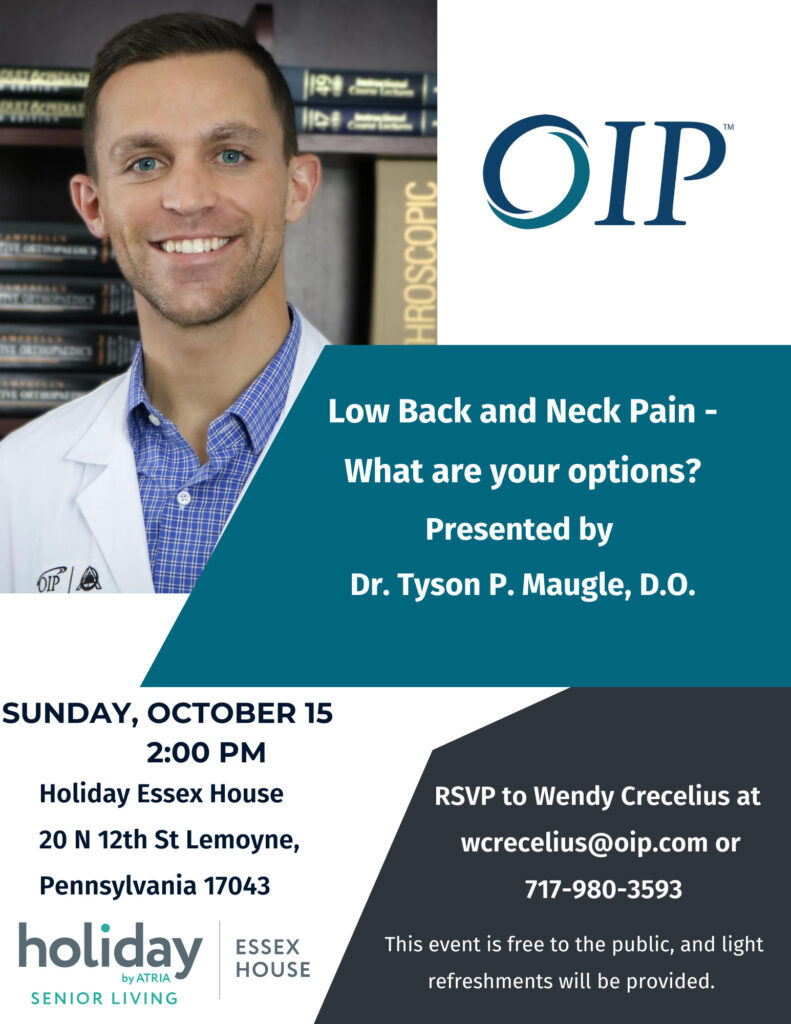
OIP Wins Simply the Best 2023 Award in 3 Categories!
OIP is proud to announce that we have won the 2023 Simply the Best awards in the following 3 categories:
- “Simply the Best” – Walk-In Urgent Care Facility / OIP Orthopedic Clinic
- “Simply the Best” – Physical Therapist / OIP Physical Therapy
- “Simply the Best” – Pain Specialist Clinic / Orthopedic Institute of Pennsylvania
You can view this announcement in the August 2023 issue here.
Thank you for your support and to everyone that voted for OIP in Harrisburg Magazine’s Simply the Best in the past!

